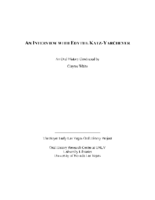Search the Special Collections and Archives Portal
Search Results
Carolyn Goodman oral history interview
Identifier
Abstract
Oral history interview with Carolyn Goodman conducted by Barbara Tabach on August 18, 2016 and August 31, 2016 for the Southern Nevada Jewish Heritage Project. Goodman talks about her Jewish ancestry, moving to Las Vegas, Nevada; raising her children, and entering into politics in the city.
Archival Collection

Transcript of interview with Miriam "Mimi" Katz by Barbara Tabach, December 10, 2014
Date
Archival Collection
Description
In this interview, Mimi Katz discusses growing up in the Boston area and her schooling, and moving to Washington, D.C. working as a physiotherapist. She returned to Boston and met her husband, and she talks about moving to Las Vegas and adjusting to life here. They became involved at Temple Beth Sholom, and Mimi worked as a conventions coordinator at the Sands and the Sahara. She discusses moving around in Las Vegas from an apartment to a house in the John S. Park neighborhood, working for the Jewish Federation, and helping to develop the Holocaust education program with Edythe Katz, conducting oral history interviews with survivors. She continued working at the Convention Center in the 1980s, and is involved in the Lou Ruvo Center.
Everyone knows her as Mimi. She was born Miriam Green to immigrant parents in Boston, Massachusetts, in 1926. As a youngster she danced, excelled at school and enjoyed an abundance of sports. To pay for her higher education at Massachusetts School of Physiotherapy she worked at Raytheon Manufacturing. In 1957 she married George Katz who swept her away to their honeymoon in Las Vegas. It's a story that she loves to recall-they never left. She sent for her things and energetically settled in to her new hometown and marriage. Mimi found employment with the Clark County School District, began having children (three daughters), and making fast new friends. Many of these friends were from the founding days of Temple Beth Sholom, which roots her to the history of the local Jewish community. In addition, for a decade she worked in community relations for the Jewish Federation. She valued community activism and volunteered over the years for many organizations; such as Easter Seals, Jewish War Veterans, Parent Teachers Association and the Lou Ruvo Center for Brain Health, and many more organizations over the subsequent decades.
Text
Audio clip from interview with Elaine Galatz, April 23, 2015
Date
Archival Collection
Description
Part of an interview with Elaine Galatz on April 23, 2015. In this clip, Galatz describes how she became involved with the Jewish Federation of Las Vegas as president.
Sound

Transcript of interview with Joan and Leslie Dunn by Barbara Tabach, June 20, 2016 and May 30, 2017
Date
Archival Collection
Description
Among the stories of those who came to Las Vegas in the 1960s to work at the Nevada Test Site is that of Leslie Dunn and his wife Joan. Leslie had been hired by the U.S. Public Health Service to monitor radiation from the explosions. He has tales flying into craters that make you wide-eyed. This assignment would last until his “retirement” in 1983 – one can’t really describe this couple as retired. During these early years, while Les pursued his scientist career, Joan’s chief focus was on raising their three children, Bruce Dunn, Loryn Dunn Arkow, and Sharon Dunn Levin. She also completed her education in accounting at University of Nevada, Las Vegas. She was involved with Equal Right Amendment efforts and League of Women Voters. The couple were only in their forties when Les left the PHS. As he looked forward to new opportunities, he felt compelled to pursue his longtime dream to become a builder, something he had dabbled at as a youngster with his father, Jack Dunn. Together, he an
Text

Transcript of interviews with Edythe Katz-Yarchever by Claytee White, 2000-2005
Date
Archival Collection
Description
Transcript of interviews with Edythe Katz-Yarchever by Claytee White over the course of several sessions in 2000, 2003 and 2005. In the interviews, Katz-Yarchever discusses her life in Las Vegas, owning theaters with her husband, Lloyd Katz, and the strides they made in civil rights. She talks about her service in Civil Defense and the National Guard, and moving to various places, then working in California and meeting her husband, Lloyd. The Katzes became involved in the community in various ways with Operation Independence and Holocaust education. About a decade after Lloyd's death, Edythe married Judge Gilbert Yarchever.
Edythe Katz-Yarvhever was born in Boston, a second generation American whose grandparents left Russia the century before. Edythe completed finishing school at the start of World War II and worked various jobs at home before joining the Civil Defense, and later, the National Guard. She moved to Maryland and got a job as a secretary at Edgewood Arsenal, then transferred to Cushing General Hospital to assist a Marine Corps neurologist, who was also a Jewish refugee. Towards the end of the war, she is transferred to an Army hospital in Hawaii, and thus began the rest of her life on the West Coast. When the war ended, Edythe sailed to California and worked various jobs in Los Angeles: in the secretarial pool at MGM Studios, for a casting agency and for a hotel magazine. Edythe met Lloyd Katz in San Francisco, and the two were married after a short courtship. The couple lived in San Francisco before moving to Las Vegas in 1951, where they took over the management of the Huntridge, Palace and Fremont theaters, then leased by Edythe's parents. The Katzes took a stand to desegregate their theaters, allowing black customers to sit with white patrons. Edythe and Lloyd became active in the city's Civil Rights Movement, including work with Operation Independence and the NAACP. Edythe started organizations like Volunteers for Education and Junior Art League, and directed an interfaith, interracial preschool. Lloyd would frequently open up their theaters to organizations to hold fundraisers, free-of-charge. Edythe was extremely active in the local Jewish community, including opening the city's first Jewish gift shop, serving as sisterhood president at her synagogue and starting the Jewish Reporter. She later founded a library for Holocaust education as well as assisted the school district's development of curriculum and teacher training relating to the Holocaust. Lloyd Katz passed away in 1986, and in 1995, Edythe married Gilbert Yarchever. Edythe and Lloyd's community service work was honored with the naming of their school, the Edythe and Lloyd Katz Elementary School, where Edythe still remains active.
Text
Todd S. Polikoff oral history interview
Identifier
Abstract
Oral history interview with Todd Polikoff conducted by Barbara Tabach on August 30, 2016 for the Southern Nevada Jewish Heritage Project. He discusses investing over twenty years in leadership for the Jewish Federation and the American Israel Public Affairs Committee in states that include New Jersey, Delaware, Texas, Ohio, and Nevada.
Archival Collection
Michael Tell oral history interview
Identifier
Abstract
Oral history interview with Michael Tell conducted by Barbara Tabach on January 06, 2018 for the Southern Nevada Jewish Heritage Project. Tell discusses growing up around anti-Semitism in Las Vegas, Nevada, the
Archival Collection
Harry Kogan oral history interview
Identifier
Abstract
Oral history interview with Harry Kogan conducted by Barbara Tabach on January 12, 2016 for the Southern Nevada Jewish Heritage Project. As he nears his 100th birthday, Kogan discusses his Jewish heritage, growing up the son of Russian immigrants, being in the commercial refrigeration business with his brothers, and his philanthropy.
Archival Collection
Rabbi Felipe Goodman oral history interview
Identifier
Abstract
Oral history interview with Rabbi Felipe Goodman conducted by Barbara Tabach on March 09, 2015 for the Southern Nevada Jewish Heritage Project. Goodman discusses becoming a rabbi of the oldest synagogue in Las Vegas, Nevada, the Rabbi Board, and about Las Vegas’ Jewish community.
Archival Collection
Mike and Sallie Gordon oral history interview
Identifier
Abstract
Oral history interview with Mike and Sallie Gordon conducted by Adrianne Massa on March 02, 1977 for the Ralph Roske Oral History Project on Early Las Vegas. In this interview Mike and Sallie Gordon talk about being some of the first Jewish people to come to Las Vegas, Nevada when they moved to the city on January 26, 1932. They also discuss being involved members of a group of Jewish pioneers and being founding members of the Temple Beth Sholom, Las Vegas's first synagogue. They also discuss the growth and changes of the valley between the early 1930s and mid-1970s.
Archival Collection
